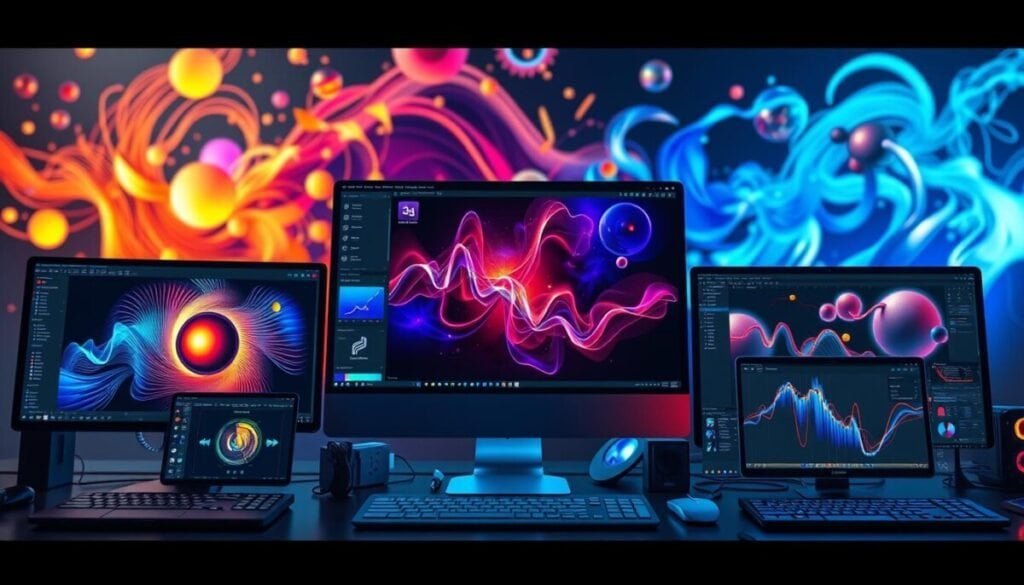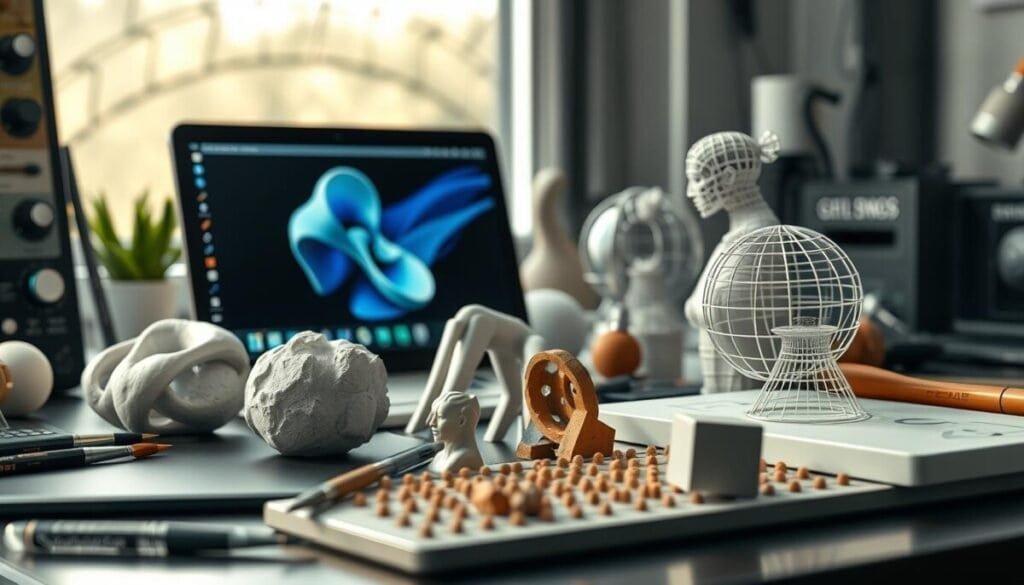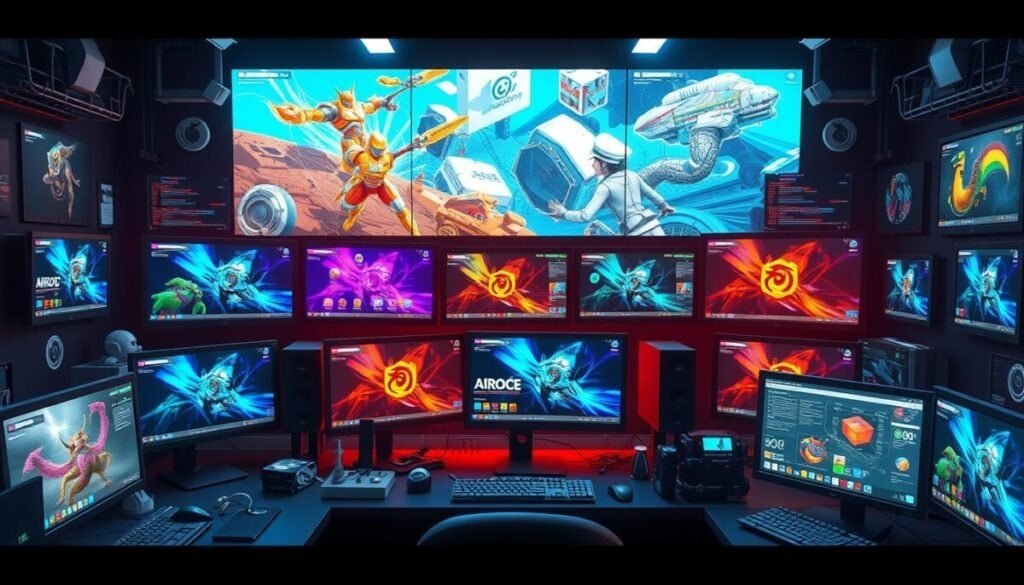As a kid, I loved animated movies. The magic of characters coming to life on screen sparked my imagination. This passion shaped my career in 3D modeling and animation.
In this guide, we’ll explore 3D modeling animation tools. We’ll look at software for digital content, motion graphics, and character animation. This journey is for everyone, whether you’re new or experienced in 3D creation.
The world of 3D modeling and animation is vast and changing. We’ll check out different software types, like digital content tools and game engines. We’ll focus on popular ones like Blender, Maya, and 3ds Max, discussing their features and uses.
For beginners, we’ll show tools that can start your 3D journey. We’ll also look at advanced features in professional software. This will give you a peek into the latest techniques used in movies and games.
Key Takeaways
- 3D modeling and animation tools range from beginner-friendly to professional-grade software
- Digital content creation tools, game engines, and collaboration platforms form the backbone of 3D animation
- Popular software like Blender, Maya, and 3ds Max offer unique features for various 3D projects
- Beginner tools provide accessible entry points for newcomers to 3D modeling and animation
- Advanced features in professional software enable cutting-edge techniques in films and games
Introduction to 3D Modeling and Animation
3D modeling and animation software has changed digital art and visual effects. These tools let artists bring their ideas to life. They create amazing visuals for movies, games, and buildings. Courses in 3D modeling are getting very popular, with over 12,000 people signing up for one.
The process of making 3D animations begins with modeling. This skill requires practice in areas like anatomy. Artists use digital sculpting, boolean modeling, and laser scanning to make detailed 3D models. In fields like product design and architecture, NURBS modeling is key.
In animation studios, 3D modelers are vital. They turn concept art into 3D models, manage digital assets, and work with other artists. Knowing software like ZBrush, Mudbox, 3Ds Max, Maya, and Blender is crucial. ZBrush is great for digital sculpting, and Maya is a top choice for animation.
| Software | Specialization | Industry Use |
|---|---|---|
| ZBrush | Digital Sculpting | High-resolution 3D models |
| Mudbox | Texture Painting | Map creation |
| 3Ds Max | Modeling | Video games, TV commercials |
| Maya | Animation | Film and TV production |
For newbies, online courses are a good place to start. A basic course usually takes about 27 hours. It includes videos, readings, quizzes, and projects. These courses give a strong base in 3D modeling, setting students up for careers in this exciting field.
Types of 3D Animation Software

The world of 3D animation is full of different software types. Each one meets specific needs in the 3d animation pipeline. We’ll look at three main types: Digital Content Creation tools (DCCs), game engines, and collaboration tools.
Digital Content Creation Tools (DCCs)
DCCs are key for 3D modeling and animation. They let artists create and animate 3D art. Popular DCCs include Autodesk Maya, Blender, and 3ds Max. Each has its own strengths:
- Autodesk Maya is great for character animation in games and films
- Blender, free and open-source, is versatile across many industries
- 3ds Max is widely used in game development and architectural visualization
Game Engines
Game engines are vital for real-time 3D rendering and game development. Two major players are:
- Unreal Engine: Known for creating interactive 3D environments
- Unity: Popular for its user-friendly interface and versatility
These engines aren’t just for games. They’re also used in film, architecture, and medical training simulations.
Collaboration Tools
In team projects, collaboration tools are crucial. They include version control systems and digital asset management software. They help keep the 3d animation pipeline efficient by:
- Tracking changes in 3D models and animations
- Managing large files and assets
- Facilitating seamless teamwork across different stages of production
| Software Type | Primary Use | Examples |
|---|---|---|
| DCCs | 3D modeling and animation | Maya, Blender, 3ds Max |
| Game Engines | Real-time rendering, game development | Unreal Engine, Unity |
| Collaboration Tools | Version control, asset management | Perforce, ShotGrid |
Popular Digital Content Creation Tools

Digital content creation tools are key in 3D modeling and animation. We’ll look at four top software options that pros use for their work.
Autodesk 3ds Max
In 2024, 3ds Max is the top choice for 3D modeling. It’s loved by game developers, interior designers, and architects. Its professional tools and wide use across industries make it stand out.
Blender
Blender is the best free 3D modeling software. It’s open-source, drawing in both newbies and experts. It’s great for character animation and offers two main workflows.
Autodesk Maya
Maya is the top for animation in 3D modeling software. It has powerful tools for character animation and supports simulations like fluid dynamics. Its use with third-party renderers like Arnold adds to its appeal.
SideFX Houdini
Houdini is known for its procedural workflow and advanced visual effects. It’s especially good at fluid dynamics and particle simulations. This makes it a top choice for complex visual effects.
| Software | Best For | Trial Period | Pricing |
|---|---|---|---|
| 3ds Max | Modeling, Game Development | 30 days | $2,605/year* |
| Blender | Character Animation | Free | Free |
| Maya | Professional Animation | 30 days | $2,605/year* |
| Houdini | Visual Effects | Varies | Varies |
*Price includes Media & Entertainment Collection
Each tool has its own strengths and how it fits into the 3D animation pipeline. The right choice depends on your project’s needs and your personal preferences.
Game Engines for 3D Animation

Game engines have changed 3D animation a lot. They make interactive 3D worlds and real-time rendering possible. Unreal Engine and Unity are two big names in this field.
Unreal Engine, made by Epic Games, is known for its top-notch real-time rendering. It’s not just for games anymore. Film and architecture industries also use it. Its Multi-User Editor helps teams work together on big projects.
Unity, on the other hand, is loved for its easy-to-use interface and big community support. It’s great for making detailed 3D models and supports mixed and augmented reality games. Its flexibility makes it popular in many industries.
Both engines have amazing features:
- Real-time rendering for instant visual feedback
- Physics simulation for realistic object interactions
- Integration with popular Digital Content Creation tools
- Support for Virtual Reality and Augmented Reality development
These engines were first for games but now are used in many areas. They’re used in car design, medical training, and even in making movies and TV shows virtually.
The growth of game engines in 3D animation shows a move towards more interactive and immersive content. As tech keeps getting better, we’ll see even more creative uses of these tools in 3D animation and more.
3D Modeling Animation Tools for Beginners

For those starting in 3D animation, the right tools are key. Beginner-friendly software has simple interfaces and features for newbies. This lets them make great animations without needing to know a lot.
Akeytsu
Akeytsu has a clean, easy-to-use interface. It focuses on the basics of animation, making it great for beginners. Its simple design helps new users avoid getting lost in too many options.
Daz Studio
Daz Studio is a free tool for 3D animation. It comes with pre-made models and assets, making it easy for beginners. Users can explore a wide range of 3D content, helping them learn animation without starting from scratch.
Mixamo
Mixamo is owned by Adobe and is all about character animation. It has auto-rigging, saving beginners a lot of time. Plus, it has a huge library of animations, making it easy to add professional-looking movements to characters.
These tools are perfect for starting in 3D animation. They offer simple interfaces, pre-made assets, and automated features. This lets new animators create amazing work while learning and growing in this field.
Advanced Features in Professional 3D Animation Software
Professional animation tools have grown to include top-notch features for complex projects. We’ll look at some of the most advanced options in software like Autodesk Maya, 3ds Max, and SideFX Houdini.
Rigging and Character Animation
Rigging is key to making 3D characters come alive. Maya and 3ds Max are leaders in this field, offering tools for detailed skeletal structures. These tools help animators create movements that look real.
For example, Maya’s cached playback makes animation faster. This lets artists work more efficiently.
Particle Systems and Visual Effects
SideFX Houdini is known for its particle systems and visual effects. Its Pyro FX, Fluids, and Destruction FX tools help create amazing simulations. These are great for realistic fire, water, and explosions in movies and games.
Houdini’s node-based workflow makes creating complex effects easy.
Realistic Rendering Capabilities
Professional 3D software offers advanced rendering options for realistic images. Autodesk’s 3ds Max, for example, supports Open Shading Language (OSL) for better materials. Many tools now offer both CPU and GPU rendering, making the final output faster.
Cinema 4D supports multiple renderers like Arnold and Redshift. This gives artists more options for their desired look.



